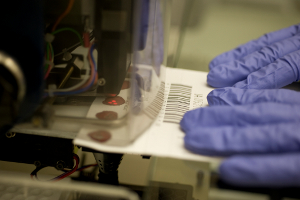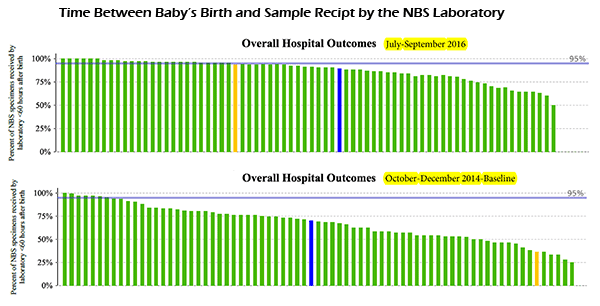Timeliness project helps save babies

NewSTEPs 360, a collaboration between the Colorado School of Public Health and the Association of Public Health Laboratories, chose Iowa as one of 20 states to participate in a new Collaborative Improvement and Innovation Network, or CoIIN, with a goal of shortening the time involved in the screening system to improve outcomes for newborns.
Ashley Comer, quality improvement coordinator for the State Hygienic Laboratory's newborn screening lab in Ankeny, said Iowa was among five states included in a CoIIN pilot project, and then was selected to participate in implementation of a three-year initiative, which began this year.
"Nationally, we were performing well, but we realized we could be doing even better," said Comer, who serves on CoIIN's five-person core team in Iowa.
 This timeliness report shows the percentage of newborn screening specimens collected by individual Iowa hospitals that are received by the State Hygienic Laboratory within 60 hours of birth. The blue bar represents the state average. The orange bar represents the percentage of specimens from a hospital that meet this time interval. The graph shows the changes in this performance from fourth quarter 2014 to third quarter 2016.
This timeliness report shows the percentage of newborn screening specimens collected by individual Iowa hospitals that are received by the State Hygienic Laboratory within 60 hours of birth. The blue bar represents the state average. The orange bar represents the percentage of specimens from a hospital that meet this time interval. The graph shows the changes in this performance from fourth quarter 2014 to third quarter 2016.Newborn screening is a first step in identifying certain inherited conditions.
Screening in Iowa begins with birthing providers collecting a few drops of blood from a newborn’s heel shortly after birth. A courier travels year-round throughout the state to collect these specimens and deliver them to the State Hygienic Laboratory newborn screening section, which also operates 365 days a year, including weekends and holidays.
The State Hygienic Lab is able to screen the dried blood spot for more than 50 conditions that may cause serious health concerns such as illness, physical disability, intellectual disability or even death if left untreated.
Presumptive positive results are reported to short-term follow-up staff in the Division of Medical Genetics at the University of Iowa Stead Family Children’s Hospital, who follow up rapidly with the baby's primary care provider. Recommendations made by the division may include further testing, referrals to specialists, referrals to certified Cystic Fibrosis Centers, treatment or dietary changes.
By shortening the time from specimen collection to treatment of conditions, intervention may begin to limit the devastating health consequences of certain conditions.
"While timeliness is the overall goal, each state sets its goal specific to that state," Comer said of the national initiative, funded by $5.4 million through the Health Resources and Service Administration.
Iowa's goal by January 2017 is to receive 95 percent of specimens at the State Hygienic Laboratory within 60 hours of a baby's birth, half the time of the national goal of five days. The average at the beginning of the year for birthing providers throughout the state that achieved the 60-hour interval was 70 percent. By the fall of 2016, that number increased to 90 percent.
Comer said if the 95 percent goal is achieved, Iowa will strive to maintain that rate and work on other goals, such as reaching out to midwives to include more out-of-hospital births, as well.
Hospitals are notified of their timeliness progress in regular CoIIN reports— a snapshot of how the facility is performing compared with the state and other hospitals. At this time, the hospitals are not identified by name on the report.
"We've certainly seen a great improvement, both on the state and individual hospital levels," Comer said.
The work has revealed some of the reasons for delays. Some hospital staff waited until just before the baby was discharged to take the blood samples. Others collected blood spots within the specified 24- to 48-hour post-birth timeframe, but may not have understood the timing to get the samples to the courier.
"No one told them they needed to do it a different way," Comer said. "Really, doing some re-education is key. The hospitals want to do the right thing."
The team is doing outreach at birthing centers, both on-site and online.
A series by the Milwaukee Journal Sentinel found that many states fail to meet the three-day turnaround time recommend by federal guidelines and highlighted cases in which some of those delays were deadly. At the same time, the newspaper cited the Iowa Newborn Screening Program as a national leader in timeliness.
Iowa was the first state to create a courier system to collect blood spot specimens from birthing facilities around the state and deliver them the same day to the lab in Ankeny.
The Iowa Newborn Screening Program is administered by the Iowa Department of Public Health.
About four million babies are born in the United States annually; about 12,000 of those infants have rare, but serious, conditions. Of the nearly 40,000 babies born in Iowa each year, approximately 70 infants may have one of those potentially devastating conditions. The State Hygienic Laboratory and the University of Iowa Stead Family Children’s Hospital follow-up program also provides screening for more than 13,000 babies born in North Dakota and more than 13,000 born in South Dakota each year.



